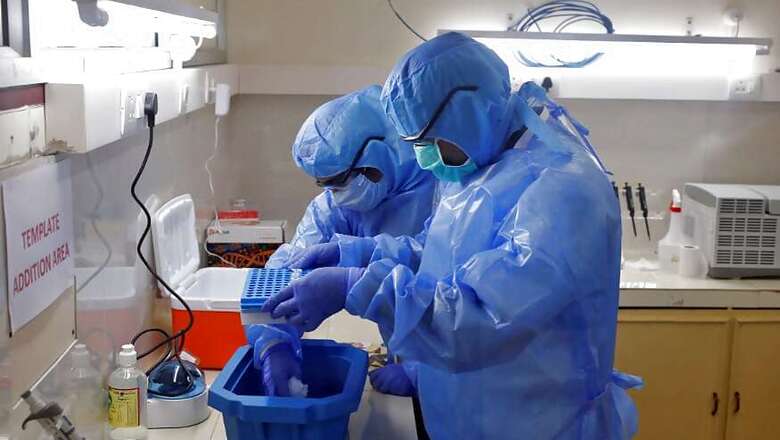
views
With governments and pharma companies across the world racing against time to develop a vaccine for Covid-19, the Union Ministry of Science and Technology's Department of Biotechnology (DBT) aims to make rapid and molecular diagnostics tests available by the end of next month.
In an interview with News18, DBT Secretary, Dr Renu Swarup talks about a range of issues, including the prospects of India’s vaccine development endeavours and the accuracy of the virus being a ‘lab release’ theory.
Serum Institute will be manufacturing the vaccine being developed by Oxford University, but no Indian company seems to be in the first curve of vaccine development. Despite having a host of biotech companies, why are we lagging in the race for vaccine research and development?
The current Covid-19 pandemic is a public health crisis of the deepest international concern. Vaccine development is a global effort, which means that it needs to be accessible worldwide. We should be happy that an Indian company is doing that. We are not lagging, as a large number of industries and research institute are working on vaccine candidate.
India is among the largest manufacturer of generic drugs and vaccines in the world. It is home to half a dozen major vaccine makers, making doses against polio, meningitis, pneumonia, rotavirus, BCG, measles, mumps and rubella, among other diseases. Now, half a dozen Indian firms are developing vaccines against Covid-19. Serum, in collaboration with Codagenix, an American biotech company, is also developing a "live attenuated" vaccine. Hyderabad-based Bharat Biotech is working on two vaccine candidates.
Zydus Cadilla is working on two vaccines, while Biological E, Indian Immunologicals, and Mynvax are developing a vaccine each. Another four or five home-grown vaccines are in early stages of development. DBT is funding the vaccine development efforts under its National Biopharma Mission to fast track these efforts.
In the post-coronavirus world, it appears that India can emerge as a viable alternative to China for G-7 countries. Has your department drawn up plans to boost Make in India and increase exports?
There is a significant push to bring in indigenous products in India. Covid-19 has given us enough reasons to strengthen our indigenous product development and boost Make in India not only for domestic markets but also for the world. The Make in India cell at BIRAC (Biotechnology Industry Research Assistance Council, a PSU of Department of Biotechnology) has been central to assisting startups and connecting them to investors and investments.
Now, with the economic crisis, startups are facing more challenges and have made our role more critical. A new Fast Track Review mechanism has been evolved to support startups for COVID solutions. The review body aims to find co-funding partners and help to mobilise CSR funds for the research consortium.
What have India’s sequencing efforts revealed about the Sars-Cov-2 virus?
India has shared genome sequence to the global body. Various institutes like National Institute of Virology (ICMR), Gujrat Biotechnology Research Centre, IGIB (CSIR), National Institute of Biomedical Genomics (DBT-NIBG) are working to support a global genome database. It aims to enhance understanding of the virus and to develop a vaccine.
Continuous monitoring and analysis of the sequences are vital to understanding the genetic evolution and rates of substitution of the SARS-CoV-2. It also immensely helps epidemiological investigations. Recently, the Department of Biotechnology has undertaken a project to sequence 1,000 SARS-CoV-2 genomes from samples across India to understand the evolving behaviour of the virus that causes Covid-19. The study would help understand emerging mutations in the virus and how they affect the symptoms of the disease.
There are several theories about the outbreak doing the rounds. Is there any scientific evidence backing the lab release theory?
The WHO has maintained that identification of the animal source of the virus through international scientific and collaborative missions, in collaboration with the World Organization for Animal Health and the UN's Food and Agriculture Organization is one of its priorities. However, there is scientific consensus that available data suggested that the virus was not genetically engineered.
DBT has recently said that India seeks to become self-reliant in the production of RT-PCR and Antibody test kits by the end of next month. How will this target be met?
Yes, we are working towards meeting the country's demand during the national crisis by making rapid and molecular diagnostics available for Covid-19. Department of Biotechnology (DBT) under its National Biopharma Mission is supporting the Andhra Pradesh MedTech Zone which is Asia's first medical equipment manufacturing ecosystem, uniquely dedicated for Medtech.
This DBT-AMTZ COMManD strategy would ensure that rapid infrastructure capabilities are used for progressively improving the domestic manufacturing capabilities in the medical technology sector in a quick and quality assured manner. We have also supported some ICMR-approved startups to scale up their production. Indigenous development and production of resources and components for kits manufacturing are also being supported.




















Comments
0 comment